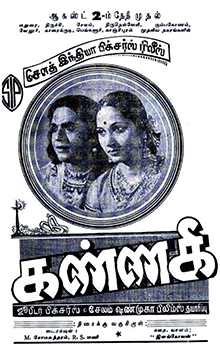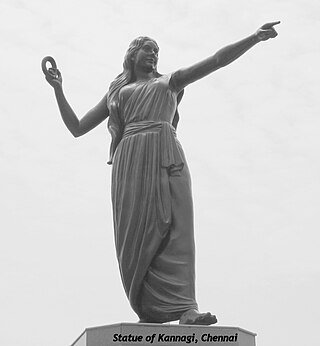
Kannagi, sometimes spelled Kannaki, is a legendary Tamil woman who forms the central character of the Tamil epic Cilappatikaram. Kannagi is described as a chaste woman who stays with her husband despite his adultery, their attempt to rebuild their marriage after her unrepentant husband had lost everything, how he is framed then punished without the due checks and processes of justice. Kannagi proves and protests the injustice, then curses the king and city of Madurai leading to the death of the unjust Pandyan King of Madurai, who had wrongfully put her husband Kovalan to death. The society that had made her suffer, suffers in retribution as the city Madurai is burnt to the ground because of her curse. In Tamil folklore, Kannagi has been deified as the symbol – sometimes as goddess – of chastity, with sculptures or reliefs in Hindu temples iconographically reminding the visitor of her breaking her anklet or tearing her bleeding breast and throwing it at the city.

Cilappatikāram, also referred to as Silappathikaram or Silappatikaram, is the earliest Tamil epic. It is a poem of 5,730 lines in almost entirely akaval (aciriyam) meter. The epic is a tragic love story of an ordinary couple, Kannaki and her husband Kovalan. The Cilappatikaram has more ancient roots in the Tamil bardic tradition, as Kannaki and other characters of the story are mentioned or alluded to in the Sangam literature such as in the Naṟṟiṇai and later texts such as the Kovalam Katai. It is attributed to a prince-turned-monk Iḷaṅkō Aṭikaḷ, and was probably composed in the 2nd century CE.

The Five Great Epics are five Tamil epics according to later Tamil literary tradition. They are Silappatikāram, Manimekalai, Cīvaka Cintāmaṇi, Valayapathi and Kundalakesi.

Kovalan is a central character in Ilango Adigal's Silappatikaram, one of the ancient Tamil epics.
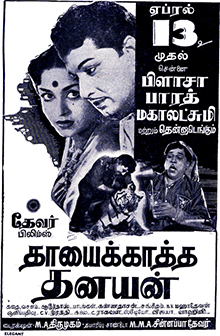
Thayai Katha Thanayan is a 1962 Indian Tamil-language film, directed by M. A. Thirumugam and produced by Sandow M. M. A. Chinnappa Thevar. The film stars M. G. Ramachandran, M. R. Radha and B. Saroja Devi. It was released on 13 April 1962.
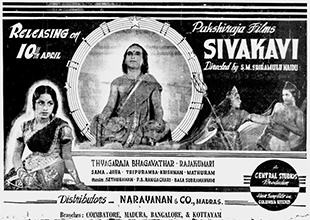
Sivakavi is a 1943 Indian Tamil-language film directed, initially, by P. K. Raja Sandow and later, S. M. Sriramulu Naidu. It starred M. K. Thyagaraja Bhagavathar, S. Jayalakshmi, Serukalathur Sama, Thirupurambal, T. R. Rajakumari, N. S. Krishnan and T. A. Mathuram. The film's screenplay was written by Thiru Muruga Kirubanandha Variyar. The film was shot at Central Studios and released by Pakshiraja Films in Coimbatore. The film was released on 10 April 1943.
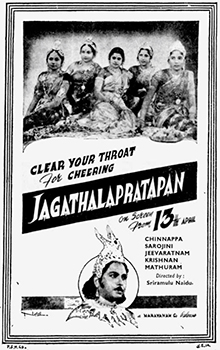
Jagathalapratapan is a 1944 Indian Tamil-language film starring P. U. Chinnappa and M. S. Sarojini. A film adaptation of a folk tale "12 Minister's Tale", the film also features P. B. Rangachari, M. R. Santhanalakshmi and N. S. Krishnan playing supporting roles. The film revolves around the theme of a prince who through his talents wins over several girls and marries them. The film was released on 13 April 1944 and became a box-office success and established Chinnappa as one of the top stars in Tamil cinema.
Sozhavanthan Varadharajan Venkatraman, also known as SVV, was an Indian actor, singer, and music director, who was active in the Indian film industry from 1938 to the 1970s.

Poompuhar is a 1964 Indian Tamil-language epic film directed by P. Neelakantan and written by M. Karunanidhi. It is the second film based on the epic Cilappatikaram after Kannagi (1942). The film stars S. S. Rajendran, C. R. Vijayakumari, Rajasree and K. B. Sundarambal. It was released on 18 September 1964.
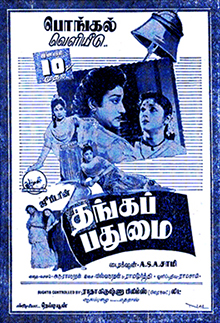
Thanga Padhumai is a 1959 Indian Tamil language film starring Sivaji Ganesan and Padmini. The film was co-written and directed by A. S. A. Sami, produced by M. Somasundaram under Jupiter Pictures, and had music by Viswanathan–Ramamoorthy. Thanga Pathumai proved to be a hit in its re-release, and won National Film Award for Best Feature Film in Tamil for the year 1959.

Utthama Puthiran is the 1940 Tamil language film directed by T. R. Sundaram. P. U. Chinnappa, M. V. Rajamma, T. S. Balaiah played the lead roles. It was the first Tamil film in which the leading actor P. U. Chinnappa played a double role.

Thai Sollai Thattathe is a 1961 Indian Tamil-language action drama film directed by M. A. Thirumugam. The film stars M. G. Ramachandran and B. Saroja Devi, with M. R. Radha, S. A. Ashokan, V. R. Rajagopal, and P. Kannamba in supporting roles. It revolves around a police officer who is tasked with apprehending his brother, a criminal.
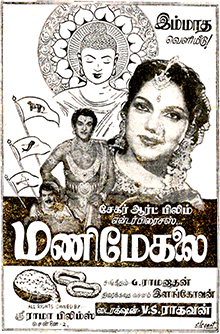
Manimekalai is a 1959 Indian Tamil-language epic film directed by V. S. Raghavan and written by Elangovan, starring T. R. Mahalingam and P. Bhanumathi. It is based on the epic of the same name by Chithalai Chathanar.
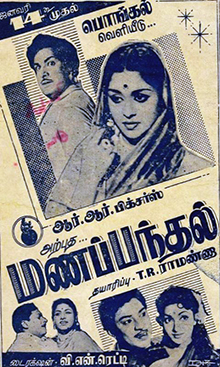
Manapanthal is 1961 Indian Tamil-language romance film, directed by V. N. Reddy, produced by T. R. Ramanna and written by Thuraiyur K. Moorthy, with music by Viswanathan–Ramamoorthy. The film stars S. S. Rajendran, S. A. Ashokan, B. Saroja Devi and E. V. Saroja, with P. Kannamba, V. Nagayya, Rama Rao, K. A. Thangavelu and M. Saroja in supporting roles. The film was simultaneously made in Telugu as Intiki Deepam Illale; both versions are based on the American film Sabrina (1954).
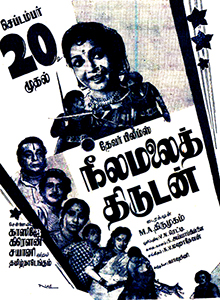
Neelamalai Thirudan is a 1957 Indian Tamil-language swashbuckler film directed and edited by M. A. Thirumugam, produced by Sandow M. M. A. Chinnappa Thevar and written by S. Ayyaiah Pillai. The film stars R. Ranjan and Anjali Devi, with T. S. Balaiah, K. A. Thangavelu, P. S. Veerappa, M. K. Radha, E. R. Sahadevan, Kannamba and E. V. Saroja in supporting roles. It revolves around a man seeking to avenge his family that was separated during his childhood due to his greedy uncle.

Vaazha Vaitha Deivam is 1959 Indian Tamil-language romantic drama film, directed by M. A. Thirumugam, produced by Sandow M. M. A. Chinnappa Thevar and written by Aaroor Dass with music by K. V. Mahadevan. It stars Gemini Ganesan and B. Saroja Devi, with T. S. Balaiah, V. K. Ramasamy, S. V. Subbaiah, P. Kannamba and T. P. Muthulakshmi in supporting roles. The film was released on 28 August 1959 and emerged a box office success.

Uthami Petra Rathinam is a 1960 Indian Tamil-language drama film directed by M. A. Thirumugam and written by Aaroor Dass. The film stars K. Balaji, Malini and P. Kannamba, with T. K. Ramachandran, M. N. Rajam, Pandari Bai, S. V. Sahasranamam, Kuladeivam Rajagopal and Manorama in supporting roles. It was released on 1 April 1960, and failed at the box office.
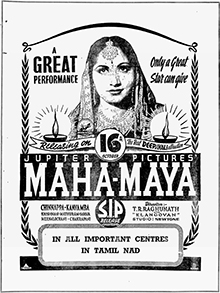
Mahamaya is a 1944 Indian Tamil-language historical drama film directed by T. R. Raghunath, starring P. U. Chinnappa and P. Kannamba. It was released on 16 October 1944.

Sudharshan is a 1951 Indian Tamil-language film directed by A. S. A. Sami and Sundar Rao Nadkarni. The film stars P. U. Chinnappa and P. Kannamba. The story is based on a popular folk myth about a Panduranga devotee Gora who was a potter by trade. The same story was filmed simultaneously by Gemini Studios. The Gemini version Chakra Dhari was released early and due to unknown reason Sudharshan was delayed.

Mangayarkarasi is a 1949 Indian Tamil-language film directed by Jiten Banerjee. The film was produced by F. Nagoor and S. N. Ahamed, and stars P. U. Chinnappa, P. Kannamba and Anjali Devi. It is a remake of the Telugu film Gollabhama (1947) and Anjali Devi reprised her role.
